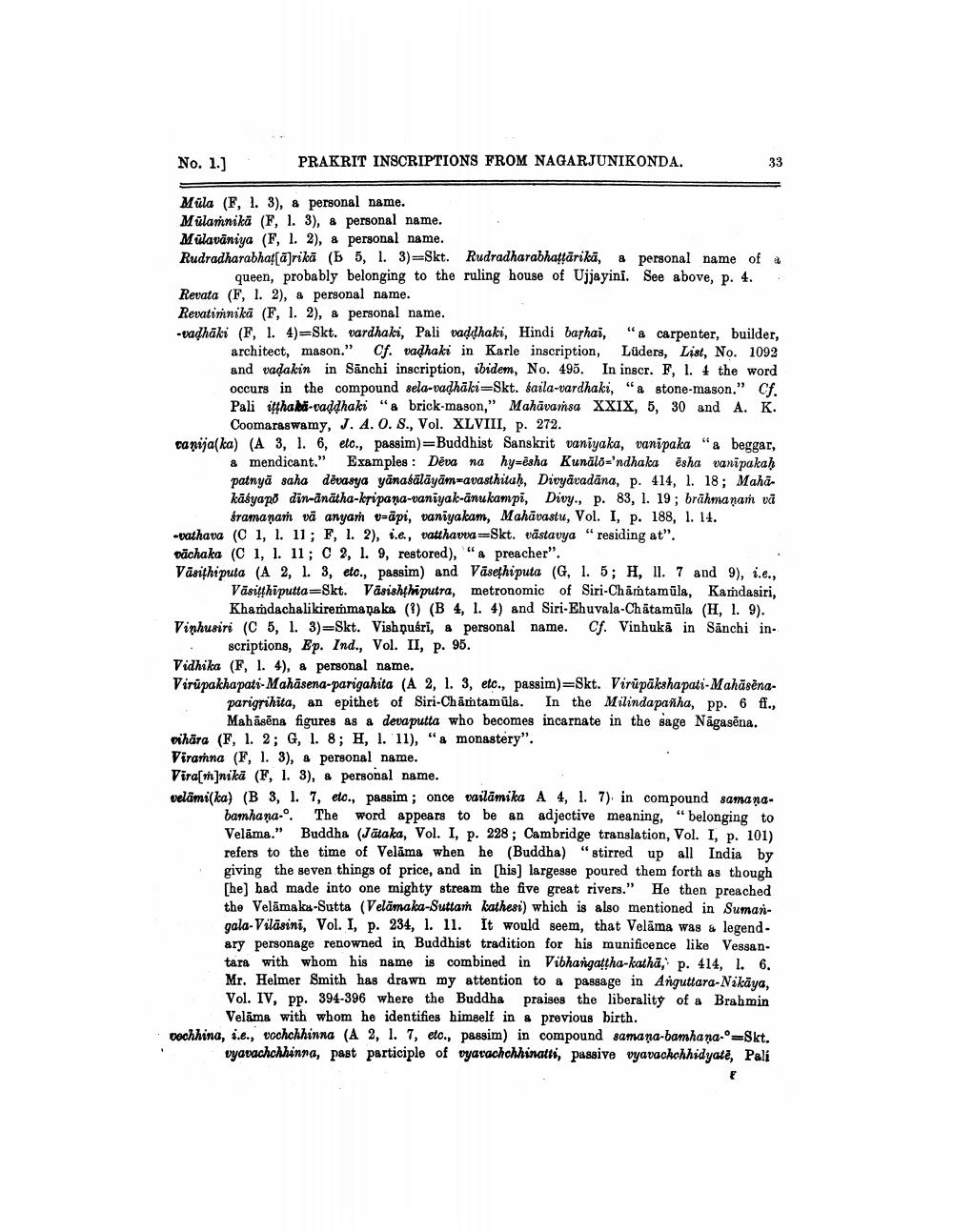________________
No. 1.]
PRAKRIT INSCRIPTIONS FROM NAGARJUNIKONDA.
Müla (F, 1. 3), & personal name. Mülaṁnikā (F, 1. 3), a personal name. Mülavāniya (F, I. 2), a personal name. Rudradharabha (@rikā (5 5. I. 3)Skt. Rudradharabhaffärikä, personal name of 4
queen, probably belonging to the ruling house of Ujjayini. See above, p. 4. . Revata (F, I. 2), a personal name. Revatimnikā (F, I. 2), & personal name. -vadhāki (F, 1.4)-Skt. vardhaki, Pali vaddhaki, Hindi barhai, "a carpenter, builder,
architect, mason." Cf. vadhaki in Karle inscription, Lüders, List, No. 1092 and vadakin in Sünchi inscription, ibidem, No. 495. In inscr. F, I. 4 the word occurs in the compound sela-vadhāki=Skt. saila-vardhaki, "a stone-mason." Cf. Pali ithala-vaddhaki "a brick-mason,” Mahāvansa XXIX, 5, 30 and A. K.
Coomaraswamy, J. A. O. S., Vol. XLVIII, p. 272. canija(ka) (A 3, I. 6, etc., passim)=Buddhist Sanskrit vaniyaka, vanipaka "& beggar,
a mendicant." Examples: Dēva na hy=esha Kunālo='ndhaka ēsha vanipakah patnya saha dovasya yanatālāyām=avasthitaḥ, Divyāvadāna, p. 414, 1. 18; Mahakāsyapo din-anātha-kripana-vaniyak-ānukampi, Divy., p. 83, I. 19; brāhmaṇam và
framanam và anyar v-api, vaniyakam, Mahāvastu, Vol. I, p. 188, I. 14. -vathava (C1, I. 11; F, 1. 2), ie, vatthavva=Skt. vastavya “residing at". vichaka (C1, I. 11; C 2, I. 9, restored)," preacher". Vasithi puta (A 2, 1 3, etc., passim) and Väsethipula (G, I. 5; H, II. 7 and 9), i.e..
Väsitthiputta Skt. Väsishtliputra, metronomic of Siri-Chantamüla, Kardasiri,
Khamdachalikiremanaka () (B 4, 1. 4) and Siri-Ehuvala-Chātamüla (H, 1. 9). Vinhusiri (
C5, 1. 3) Skt. Vishnusri, & personal name. Cf. Vinhuka in Sanchi in.
scriptions, Ep. Ind., Vol. II, p. 95. Vidhika (F, 1. 4), & personal name. Virüpakhapati-Mahāsena-parigahita (A 2, 1. 3, etc., passim)=Skt. Virūpākshapati- Mahāsēna
parigrihita, an epithet of Siri-Chämtamüla. In the Milindapafha, pp. 6 ff.,
Mahäsēna figures as a deva putta who becomes incarnate in the sage Någasēna. oihara (F, 1. 2; G, I. 8; H, 1. 11), "a monastery". Viranna (F, 1. 3), a personal name. Vira[m]nikā (F, 1. 3), a personal name. velāmi(ka) (B 3, 1. 7, etc., passim ; once vailāmika A4, 1. 7), in compound samana
bamhana. The word appears to be an adjective meaning, "belonging to Velāma." Buddha (Jätaka, Vol. I, p. 228; Cambridge translation, Vol. I, p. 101) refers to the time of Velāma when he (Buddha) "stirred up all India by giving the seven things of price, and in [his) largesse poured them forth as though [he) had made into one mighty stream the five great rivers." He then preached the Velāma ku-Sutta (Velāmaka-Suttam kathesi) which is also mentioned in Sumargala-Vilasini, Vol. I, p. 234, 1. 11. It would seem, that Velāma was & legend ary personage renowned in Buddhist tradition for his munificence like Vessan. tara with whom his name is combined in Vibhangatha-katha, p. 414, l. 6. Mr. Helmer Smith has drawn my attention to a passage in Anguttara-Nikāya, Vol. IV, pp. 394-396 where the Buddha praises the liberality of a Brahmin
Velāma with whom he identifies himself in a previous birth. Dochhina, i.e., vochchhinna (A 2, I. 7, etc., passim) in compound samana-bamhana-=Skt.
vyavachchhinna, past participle of vyarachchhinatti, passive vyavachchhidyate, Pali




